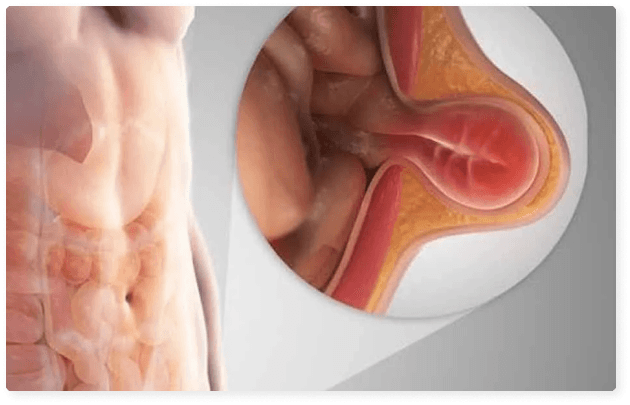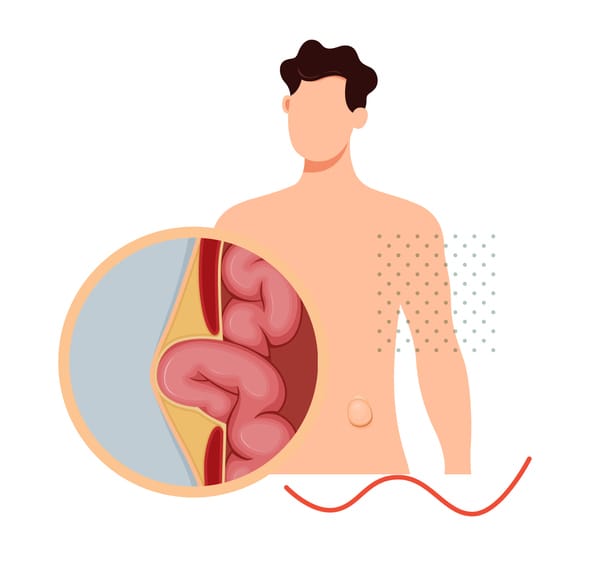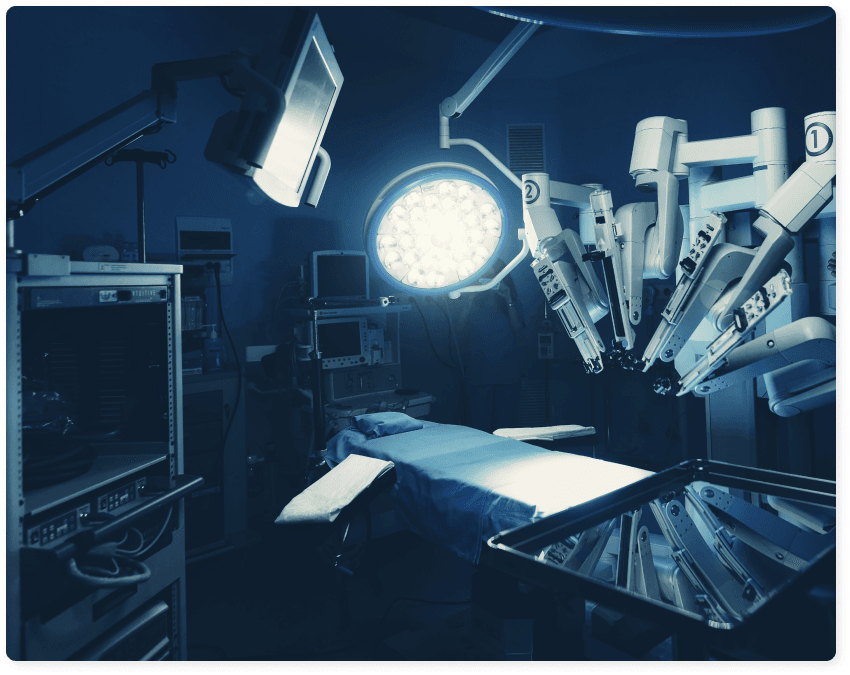Inguinal hernia
Many people suffer from inguinal hernia, as it is the most common form of hernia. It affects men more than women and is definitely one of the most common conditions a general surgeon has to deal with.
An inguinal hernia is not necessarily dangerous, but its treatment does require a visit to a specialist.
Dr. Konstantinidis and his Surgical Team can treat the hernia easily and with absolute safety, thanks to the state-of-the-art robotic system Da Vinci® at Athens Medical Center, which offers impressive results and the lowest complication rates.

What is an Inguinal Hernia?
The term inguinal hernia refers to the creation of a soft tissue protrusion, which is usually part of the membrane that surrounds the abdominal cavity or part of the intestine, through a weak point in the abdominal muscles. Inguinal hernia is associated with severe pain especially when coughing, bending over or lifting a heavy object.

Its size can vary from a small to a large mass in the groin. Although there are no specific causes for its occurrence, it is most often caused mainly by increased pressure in the abdomen, stretching during bowel movements or urination, lifting a heavy object, accumulation of fluid in the abdomen, pregnancy, excess body weight, chronic cough or the presence of a weak spot on the abdominal wall.
Why choose Dr. Konstantinidis?
Dr. K. M. Konstantinidis and his team possess vast experience in the field of laparoscopic and robotic surgery.
Dr. Konstantinidis is the pioneer of Robotic Surgery in Greece and one of the leading figures internationally in the field, having performed the largest series of General Surgery operations in Europe with the innovative Da Vinci® robotic system, including inguinal hernia surgeries.
What are the symptoms of Inguinal Hernia?
Severe pain in the groin is one of the most common symptoms, especially while coughing or lifting heavy objects. However, some hernias in the groin do not cause any symptoms other than a bulge.
In all, the most common inguinal hernia symptoms include:
A bulge in the groin
Abdominal pain, especially when bending over, coughing or lifting an object
A bulge that grows with coughing or standing
A sense of being pulled
Weakness or pressure in the groin
Possibility of pain and swelling around the testicles
How is the diagnosis made?
Once you realize that you may have an inguinal hernia It is important to consult a specialized doctor and more specifically, a general surgeon. Diagnosis is made after the necessary clinical examination and the doctor taking your history.
The doctor’s assessment is focuses mainly on determining the stage of the inguinal hernia, its size and location, and also on excluding other potential health problems. You may also need an ultrasound or a CT scan. However, clinical examination usually is enough for the diagnosis of inguinal hernia.
The specialist surgeon will then suggest an individualized treatment plan tailored to the patient’s needs.
Primarily, inguinal hernia repair requires surgery under general anesthesia. Today, the treatment of inguinal hernia is even easier through minimally invasive laparoscopic or robotic procedures.

What is the appropriate treatment for Inguinal Hernia?
There are different methods of inguinal hernia repair depending on the severity of each case. Of course, the most advanced, effective and the safest method minimizing the possibility of postoperative complications is robotic surgery.
Robotic surgery has really revolutionized the field of medical surgery as it allows complex cases to be treated with an accuracy of millimeters. When performing surgery with the Da Vinci® robotic system, the specialist surgeon can treat any incident with precision, safety and incredible efficiency, including conditions that were not previously possible.
The advantages of robotic surgery in the treatment of inguinal hernia are plenty, including:
- Far less risk of complications
- Faster recovery
- Minimal tissue injury
- Incomparable accuracy during surgery
- Excellent cosmetic result / small incisions
- Treatment of complex / recurrent inguinal hernias
What do I need to know before and after surgery?
Inguinal hernia, like any hernia of the abdominal wall, must be treated immediately because it cannot be cured on its own, it is constantly evolving and does not subside. As time goes on, it only gets worse and if left untreated can put the patient’s life in danger.
To get relief from inguinal hernia once and for all, consult a specialized general surgeon. Robotic surgery is performed under general anesthesia and ensures excellent efficiency and absolute safety both during the operation and the recovery period.
The doctor should be informed of any medication you are taking or any other condition you may be experiencing, and while taking your history you should state any previous operations, mainly in the abdomen. Recovery requires less time and the return to work and daily activities is quite fast.